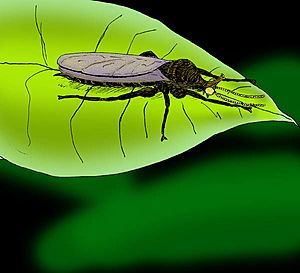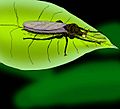Cascoplecia facts for kids
Quick facts for kids Cascoplecia |
|
|---|---|
 |
|
| Scientific classification | |
| Kingdom: | |
| Phylum: | |
| Class: | |
| Order: | |
| Infraorder: |
Bibionomorpha
|
| Family: |
Cascopleciidae
Poinar Jr., 2010
|
| Genus: |
Cascoplecia
Poinar Jr., 2010
|
| Species: |
C. insolitis
|
| Binomial name | |
| Cascoplecia insolitis Poinar Jr., 2010
|
|
The unicorn fly, officially known as Cascoplecia insolitis, is an amazing extinct insect. It was a type of fly that lived a very long time ago. Scientists found its fossil preserved in ancient amber. This special fly gets its common name because it has a unique horn-like bump on its head.
Contents
What is the Unicorn Fly?
The unicorn fly, or Cascoplecia insolitis, is an ancient fly that is now extinct. This means it no longer lives on Earth. It belonged to a group of insects called Diptera, which includes all flies. This special fly lived during the Early Cretaceous period, about 100 million years ago.
Where Did Scientists Find It?
The very first unicorn fly fossil was discovered in Burmese amber. Amber is fossilized tree resin, like a natural time capsule. When insects get stuck in sticky resin, it hardens over millions of years. This preserves them in incredible detail. The amber where the unicorn fly was found came from what is now Myanmar.
Meet the Scientist Who Named It
A scientist named George Poinar, Jr. was the one who studied and described this amazing fossil. He gave it the scientific name Cascoplecia insolitis. He also created a new family name for it, called Cascopleciidae. This shows how unique the unicorn fly is.
Why is it Called the Unicorn Fly?
The unicorn fly has a very special feature. It has three simple eyes, called ocelli, located on a long, horn-like bump on its head. This unique "horn" makes it look a bit like a tiny unicorn. That's why it earned its common name, the unicorn fly! The scientific name Cascoplecia insolitis means "old and strange," which fits this unusual ancient insect.
Images for kids
See also
 In Spanish: Cascoplecia insolitis para niños
In Spanish: Cascoplecia insolitis para niños
 | Dorothy Vaughan |
 | Charles Henry Turner |
 | Hildrus Poindexter |
 | Henry Cecil McBay |


